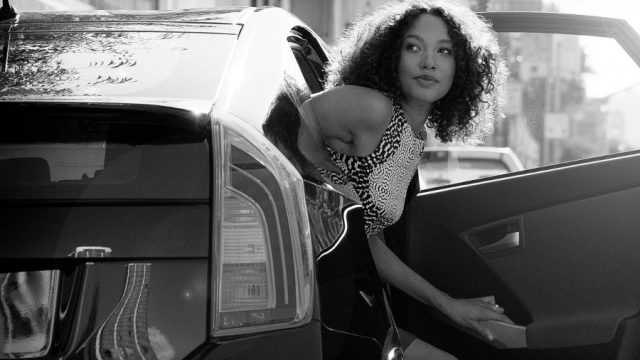[ooyala code=”plbWQ0cTpy2_e5Ed1Bx8ViEIOBAit3Xi” player_id=”91d90469ab784e6a8f7fe88cfe211e26″]
In its continuing quest to dominate all corners of the world, the high-tech taxi service Uber is now making serious inroads into Africa, much to the delight of both travelers and local African communities.
After launching in Johannesburg, South Africa in September 2013, the four-year-old Silicon Valley-based start-up rapidly expanded to Cape Town, Cairo, Durban, Lagos, and most recently, Nairobi. There are plans to extend the service to Accra as well. The company currently offers service in a total of 53 countries and 254 cities worldwide.
For those unfamiliar with the concept, Uber is a cashless taxi service where cars are summoned via an app on a smartphone. Passengers input their pickup and dropoff location into the map feature of the app, then are whisked away to their destination by whichever driver grabs the request first. The fare is paid automatically via whatever credit card the customer has on file. Prices vary according to the level of service, and are generally cheaper than conventional taxis.
The higher-end private car service is called UberBLACK, which utilizes Mercedes-Benz C-Class vehicles or Audi A4s, while the “budget” option, UberX, offers rides in Toyota Corollas, Nissan Almeras or Chevrolet Cruzes. Some cities also have UberVAN, a service that offers sport-utility vehicles to transport families or groups of people.
To give you an idea of the cost, this is how UberX is priced in Johannesburg, my home base: the base fare is R5, then it’s R7.50 per km plus R0.75 per minute, with a minimum fare of R20. So, a ride from Sandton City to OR Tambo airport using UberX would cost about R280 (more if there’s traffic), compared to at least R500 for a regular taxi.
Though traditional taxi services may grumble about getting undercut by the competition, Uber drivers and customers alike give it glowing reviews.
In South Africa,where unemployment is about 25 percent, Uber is considered a messiah of sorts for working-class people, bringing affordable fees to transportation, and allowing people with cars to become entrepreneurs.
“Guys that started with one car now have multiple vehicles,” said Alon Lits, general manager of Uber Johannesburg, to AFKInsider. “Now they’re entrepreneurs.”
Lits told IOL that the uptake since launching uberBLACK in South Africa in 2013 has been “incredible.” Though he declines to mention numbers, he says the service is doing thousands of trips per week, and there are hundreds of drivers on the system. “Drivers like the system because it gives them freedom and flexibility. No more set shifts and hours. Our partners can pick and choose the time they work, and as all payments are done via the app, it also means the driver doesn’t have to carry cash in the vehicle, making it safer for both them and the rider.”
Customers not only love the competitive pricing Uber offers, but also the convenience of being able to order a cab quickly and easily, and not having to deal with cash and tips (they are built into the pricing structure). Many customers also feel safer in Uber vehicles, as drivers are vetted by the company in a couple of different ways.
And of course the technology aspect is really cool as well: the app estimates how long it will take for your driver to arrive — so no guessing or waiting — and you are able to see in real time how close he or she is to the pickup point. You also have to the ability to phone your driver to give them special instructions (a gate code, for example), and see their name, vehicle make and model, and license plate number. When your ride is over, Uber e-mails you a receipt, and asks you to rate your driver.
Uber caters to the corporate set as well as the individual rider: companies can set up business accounts where all employees’ rides are billed to the company. They can even attach expense codes or memos to their trip information, completely removing the hassle of saving receipts and filing expense reports.
Of course Uber has its critics and downsides. During peak times, the company institutes “surge” pricing, which can be anywhere from 1.5 to 3 times the regular rate. So if you want to grab an Uber ride on New Year’s Eve, be prepared to pay through the nose. Uber apparently does this to incentivize more drivers to hit the road at busy times. And in Cape Town, police recently impounded 33 Uber vehicles in a dispute over what type of permits drivers should hold.
On a more micro level, I find that some drivers in Johannesburg are not that familiar with the city, and have trouble navigating to the destination, despite having GPS. It’s also a shame that you can’t reserve a ride in advance, since it’s all in real time. However, in Africa Uber has so far managed to avoid the major problems it has faced on other continents, such as mass protests over the undercutting of business (London, Paris, Madrid) and incidents where drivers have allegedly sexually assaulted passengers (New Delhi, Chicago).
It remains to be seen whether Uber can continue its smooth march across Africa, but in the meantime it’s a great option for travelers who want to save a buck or two and get to their destination in style.
Check out the video above, where Alon Lits talks about Uber’s potential in Africa, during Johannesburg’s Social Media Week in May 2014.

